DairyNZ opens applications for associate director role
DairyNZ is giving New Zealand farmers a unique opportunity to gain hands-on governance and leadership experience within the dairy sector.
 Ministry for Primary Industries modelling shows that 17.7% of sheep and cattle country would cease running livestock, presumably to be converted to forestry.
Ministry for Primary Industries modelling shows that 17.7% of sheep and cattle country would cease running livestock, presumably to be converted to forestry.
NZ's farming sector has been left disappointed and stunned over the Government's proposal to price agricultural emissions.
Federated Farmers argues the plans would "rip the guts out of small town New Zealand, putting trees where farms used to be". It accuses the Government of throwing out the years of work the sector put into finding a solution and said it was "deeply unimpressed" with the Government's take on what He Waka Eke Noa (HWEN) put forward.
Modelling done by Ministry for Primary Industries shows that without representation - and assuming farmers paid the levies at the farm gate - using the price proposed by HWEN of 11c a kilo of methane, by 2030 production of milksolids would be down by up to 5.9%, lamb down 21.4%, beef down 36.7% and wool down 21.1%.
The same modelling showed that 2.7% of dairy land would go out of dairy production while 17.7% of sheep and cattle country would cease running livestock, presumably to be converted to forestry.
Government modelling also shows that for every tonne of carbon dioxide equivalent reduced under the pricing scheme, about 650 kilograms of greenhouse gas will go up elsewhere in the world. That's because some reduced production in New Zealand will be replaced by higher-emissions production overseas. DairyNZ - a major signatory to HWEN - also has concerns. It says the announcement is "another step" toward a new system. However, the dairy farmer levy body adds that work is needed to "get it right" and make it fair and practical for farmers.
It especially disagrees with changes made to limit the recognition and reward farmers will get for their planting, by removing classes of sequestration like shelterbelts, woodlots and scattered trees.
It is also unhappy with the ability for farmers to form collectives to work together to report, reduce or offset their emissions - a mechanism it argues will drive the change that is needed.
Beef+Lamb New Zealand - the other major HWEN partner - is similarly concerned about the Government's decision to reduce the categories of sequestration recognised. It says sheep and beef farmers will be most heavily affected by a price on agricultural emissions - likely to be exacerbated by these proposed sequestration changes.
The Meat Industry Association (MIA) says while this proposal is better than putting the ag sector into the ETS, it still needs work. MIA points out that lower sheep and beef numbers by 30% since 1990. It adds that NZ's red meat sector is highly emissions efficient, with its carbon footprint around half of the global average.
Consultation runs for six weeks, until Nov 18, with final proposals to go to Ministers for approval in 2023.
The World Wide Sires National All Day Breeds Best Youth Camp Best All Rounder plaudit has become family affair, with 2026 Paramount Cup winner Holly Williams following in her sister Zara's footsteps.
DairyNZ is giving New Zealand farmers a unique opportunity to gain hands-on governance and leadership experience within the dairy sector.
Herd improvement company LIC has posted a 5.2% lift in half-year revenue, thanks to increasing demand for genetics.
According to the latest Fresh Produce Trend Report from United Fresh, 2026 will be a year where fruit and vegetables are shaped by cost pressures, rapid digital adoption, and a renewed focus on wellbeing at home.
The Roar is a highlight of the game hunting calendar in New Zealand, with thousands of hunters set to head for the hills to hunt male stags during March and April.
OPINION: The past few weeks have been tough on farms across the North Island: floods and storms have caused damage and disruption to families and businesses.

OPINION: Meanwhile, red blooded Northland politician Matua Shane Jones has provided one of the most telling quotes of the year…
OPINION: This old mutt has been around for a few years now and it seems these ‘once in 100-year’ weather…